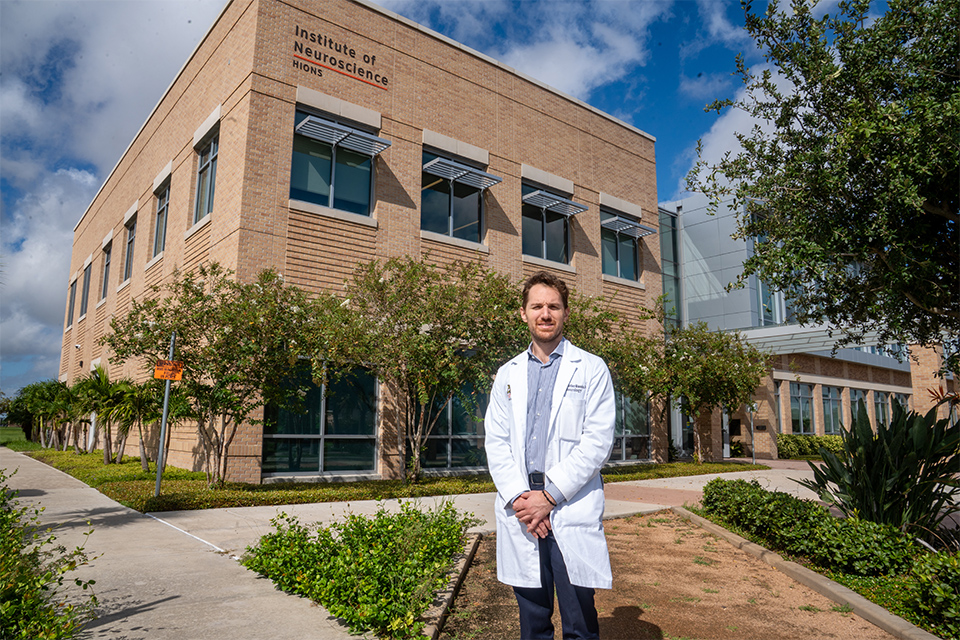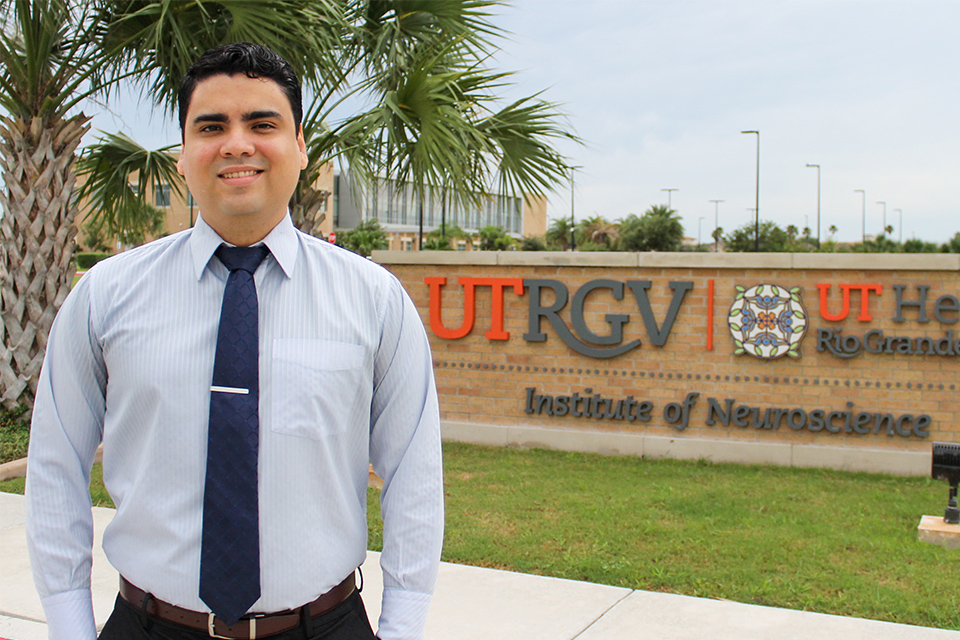By Heriberto Perez–Zuñiga
RIO GRANDE VALLEY, TEXAS – SEPT. 16, 2025 – "The brain is what makes you, you." This is how UTRGV researchers describe the organ that carries memory, identity and the essence of who we are. It also explains why the toll of Alzheimer's disease can be so devastating.
Alzheimer’s disease, a progressive neurological disorder, damages brain cells and leads to memory loss, confusion and changes in behavior and thinking that worsen over time.
In the Rio Grande Valley, where according to the Alzheimer's Association rates are among the highest in the nation, the need for answers is urgent.
This September marks both World Alzheimer's Month – raising awareness of this progressive brain disorder – and Medical Research Month – which highlights the work of research scientists and their contributions to medicine. Both are recognized by the Association of American Medical Colleges (AAMC).
At the UTRGV School of Medicine, faculty are working at the intersection of research, teaching and patient care to bring solutions to South Texas.
Among them are Dr. Jesus Melgarejo, assistant professor of Neuroscience, and Dr. Carlos Martinez-Menendez, behavioral neurologist and assistant professor of Neurology. Their studies shed light on how Alzheimer's affects Hispanic communities, a population largely underrepresented in national research despite facing a higher risk of the disease. They also focus on understanding what factors relate to the development and progression of Alzheimer’s disease.
Both credit Dr. Gladys Maestre, director of the Alzheimer's Disease Resource Center for Minority Aging Research and professor of Neuroscience, for her mentorship and leadership in advancing this work.
Maestre has dedicated her career to building research programs aimed at reducing health disparities in minority and underserved communities. Her guidance has been fundamental in shaping the research careers of faculty like Melgarejo and Martinez-Menendez, ensuring that discoveries in the Valley reach far beyond it.
"Even in the face of Alzheimer's, what makes us who we are is never forgotten," Martinez-Menendez said. "Our mission is to understand how this disease impacts our community and to use that knowledge to bring hope and better care to Valley families."
Through education and research, their work not only include discoveries but also mentors the next generation of physician-scientists, just as Maestre did for them.
For the Rio Grande Valley, this means participating in the global search for answers while ensuring that the voices and experiences of local families remain central to Alzheimer's research.
A GLOBAL PERSPECTIVE
The spark that set Melgarejo on his path ignited in high school when a neuroscience competition in Venezuela introduced him to the mysteries of the brain. That moment changed the course of his life, he said.
Today, he leads research with international reach. Recently, he received a $220,000 grant from the National Heart, Lung and Blood Institute (NHLBI) to study how irregular blood pressure patterns contribute to dementia, cardiovascular disease, and other conditions associated with aging.
This project connects Melgarejo with collaborators at Teikyo University in Japan and Universidad Autónoma de Madrid in Spain.
"Research allows us to ask important questions, test ideas and bring those discoveries back to the Valley," Melgarejo said. "We're learning ways to prevent it and improving quality of life in the long run. As well as having a better understanding of the causes and factors contributing to the disease.
The Center for Disease Control and Prevention (CDC) reports that the Rio Grande Valley carries some of the highest rates of hypertension and dementia in the nation, making this work particularly impactful.
"Studying blood pressure patterns across different populations helps us find solutions that are both universal and specific to our community," Melgarejo said.
RESEARCH WITH IMPACT
At the UTRGV School of Medicine's Institute of Neuroscience in Harlingen, located at 2902 Haine Dr., Martinez-Menendez sees patients who arrive not only with symptoms but also with fears about losing their identity. Families carry the weight of uncertainty as well.
"With Alzheimer's, you're not only caring for the patient," he said. "You're caring for the loved ones who are walking this journey alongside them. Part of my job is helping caregivers bear that burden."
His work as both clinician and researcher was recently recognized with the NIH Career Development (K) Award, the first of its kind for a UTRGV School of Medicine faculty member.
These highly competitive awards are designed to train physicians to become clinician-researchers, providing support, mentorship and dedicated time to advance their projects. Martinez-Menendez's research focuses on how Alzheimer's disease affects Hispanic populations.
"There is still so much we need to learn about how Alzheimer's impacts our local community," he said. "This grant gives us a step forward in that process."
A native of Corpus Christi, Texas, Martinez-Menendez credits UTRGV for providing him with an environment to thrive in academic medicine, where patient care, teaching and research are seamlessly blended.
"I wanted to stay in an academic institution because I love teaching and mentoring," he said. "UTRGV was the perfect fit. It is close to family, serves a bilingual community and gives me the chance to contribute to groundbreaking research in South Texas."
After all, as Martinez-Menendez said, the work is not only about neurons and memory but about protecting the very essence of what makes us human – "protecting the brain that makes us, us."
ABOUT UTRGV
Celebrating its 10th anniversary during the 2025-2026 academic year, The University of Texas Rio Grande Valley (UTRGV) is on a mission to transform the Rio Grande Valley, the Americas and the world. One of the country’s largest Hispanic-Serving Institutions and Seal of Excelencia certified, UTRGV has earned national recognition for its academic excellence, social mobility and student success since opening in Fall 2015. Ranked among the Best Colleges for your Tuition (and Tax) Dollars in 2025 by Washington Monthly (#7 nationally; #1 in Texas), UTRGV continues to break enrollment records, launch new academic and athletics programs and progress toward achieving R1 research status.
The only university in Texas with schools of Medicine and Podiatric Medicine, UTRGV’s regional footprint spans South Texas – with locations, teaching sites, and centers established in Edinburg, Brownsville, Rio Grande City, McAllen, Weslaco, Harlingen, Laredo, Port Isabel and South Padre Island.


